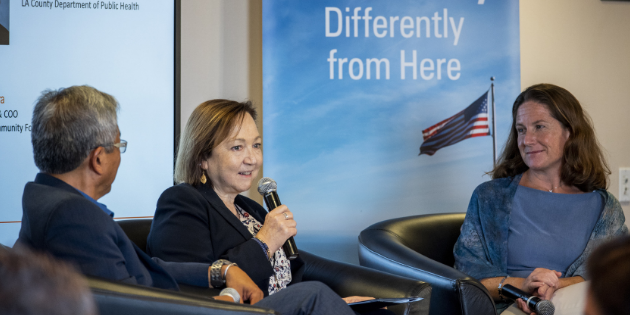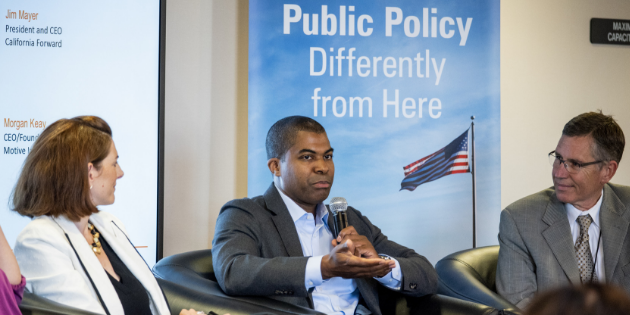Leading Cross-Sector Collaboration with an MPP Degree
Pepperdine's School of Public Policy Prepares Leaders in Government, Business, and Nonprofits

In their important book on public leadership, The Solution Revolution, government consultants Bill Eggers and Paul MacMillan note that America is undergoing a tectonic change in how it responds to public policy challenges—"a shift from a government-dominated model to one in which government is just one player among many." Into this new dynamic Eggers and MacMillan add, "social impact becomes a form of currency with real value to millions—from foundations to governments to venture philanthropists to individual citizens."
On policy issues ranging from child social services to disaster preparedness, there is an increasing awareness by leaders in the business, government, and nonprofit sectors that sustainably effective solutions will be found only through creative relationships between the sectors. As cross-sector experts Jeanne Becker and David B. Smith wrote recently in the Stanford Social Innovation Review, "With the rise in complex, interdependent, and emergent challenges, effective change to secure a brighter future will require transformative, collaborative leaders who can effectively lead cross-sector collaborations."
This renewed focus on responding to complex public policy challenges through multi-sector partnerships can be seen as a modern way of dealing with modern problems. But viewed historically, what we're witnessing is a reawakening of a genuinely American public leadership skill. In the country's first decades, foreign observers from the legendary Frenchman Alexis De Tocqueville to hundreds of others less well-known marveled at the American capacity to solve problems through inventive "associations."
And this is something that is happening at all levels of governance—from local issues to international. At our 2018 "Conference for Cross Sector Leadership," we profiled leaders who are working across sectors to support children in Los Angeles County to another who is promoting economic development in Africa. Each of our speakers highlighted the challenges of forming collaborations with partners in a different sector, but also provided encouraging examples of how this kind of leadership produced amazing results for people who are often living on the margins.
It's fair to call the past century in public policy research and education the "Era of Expertise," where experts, siloed in their particular organizations proposed policy solutions with little to no engagement between sectors, nor with much broader public involvement. In a recent essay for the academic journal, Public Administration Review, researchers Robert F. Durant and Susannah Bruns Ali allowed, "Large segments of mainstream public administration scholarship...privilege bureaucratic expertise" over the participation of residents and other sectors. Unfortunately, most of America's MPP programs can be seen as part of the problem.

Project for Cross-Sector Leadership
In 2018, the School of Public Policy (SPP) launched the Project for Cross-Sector Leadership as a way to gather, promote and support this leadership model. The "Project" is an academic "hub" for this uniquely American form of public leadership, playing three roles:
1. Educator/Trainer: Through classwork offered to current students here at Pepperdine (across the schools), and executive education-style programs (including the Fellows' program), we seek to prepare cross-sector leaders.
2. Networker/Matchmaker: From the relationships started on Monday through long standing relationships begun in the Fellows' program, we will be a gathering place for people doing this work, as we also seek to become a "matchmaker"—connecting great consultants and practitioners with those "newbies" looking for support. This may also take the form of an "Advisory Council" to the Project.
3. Promoter: Through a new website, we will be profiling great cross-sector work to audiences (especially in state/local government) who are just learning about the ways in which cross-sector leaders are responding to major public policy challenges.
In the coming years, the Project for Cross-Sector Leadership will bring public leaders from across the sectors to Malibu, engaging with students and each other.
Public Policy Career Paths
While the Project launched last year, for more than two decades, SPP has been preparing cross-sector leaders, working in the government, nonprofit, and business sectors. In fact, in looking at the career paths taken by our Masters of Public Policy (MPP) graduates for the last five years shows that 20% of our alumni went in to government, 41% went in to the policy-related private sector, 27% began careers in the nonprofit sector, and 11% went on for post graduate/doctoral studies.
At Pepperdine, we say our MPP students will "see public policy differently from here," and one way we define this is by understanding and teaching that the way we'll solve our toughest public challenges is through creative leaders in the government, business, and nonprofit sectors.